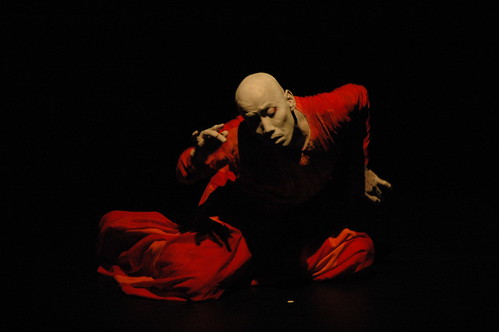京都舞踏劇場2017年4月
On a rainy evening in late April, we cycled into central Kyoto to watch a performance of Butoh.
In the words of performer Yurabe Masami:
"Since ancient times, we have been fascinated by flowers. Flowers are ever present at festivals, funerals, ceremonies, and such places of deep memory.
This fleeting life, an ephemeral flower blossom—do we not discern a world beyond time in that transitory beauty? This “beyond time” is expressed in Japanese by the word yomi, which refers to the world below. Yomi is a place of both return and resurrection. This place where the dead dwell is not an isolated otherworld, but extremely near.
For instance, during sleep or in the depths of words. Every single night asleep, we live in the world of yomi, then return home accompanied by new breath and vitality. Rather than isolated islands, aren’t our bodies within a great ocean beyond time? Is it not this new breath from yomi that causes flowers to bloom?
Butoh is for me an expression of this. Not a presentation of something with our bodies—but to feel that the body itself becomes an outrageous miracle of a flower. Along with your own body, the viewer’s..."
Indeed.
Like a previous performance, it felt vaguely like watching someone die, slowly.
Devastating. Powerful. Intimate.
Performances
Ticketing and Reservations Entry costs ¥3,000. Student discount ¥500 off. Reservations please: only eight places per performance.
Directions
Just north of the intersection of Koromonotana and Sanjo streets, Nakagyo-ku, Kyoto 604-8202 Kyoto Subway: Five-minute walk from Karasuma Line or Tozai Line; Karasuma Oike station, Exit #6. Hankyu Train: Ten-minute walk from Kyoto line, Karasuma station, Exit #22.
Photos
Hiroshi Mimura and Yuji Kohara
Inquiries: butohkan.jp
info@butohkan.jp
© JapanVisitor.com
Inside Track Japan For Kindle
© JapanVisitor.com
Goods From Japan delivered to your home or business
On a rainy evening in late April, we cycled into central Kyoto to watch a performance of Butoh.
 |
| Yurabe Masami Perfoming |
"Since ancient times, we have been fascinated by flowers. Flowers are ever present at festivals, funerals, ceremonies, and such places of deep memory.
This fleeting life, an ephemeral flower blossom—do we not discern a world beyond time in that transitory beauty? This “beyond time” is expressed in Japanese by the word yomi, which refers to the world below. Yomi is a place of both return and resurrection. This place where the dead dwell is not an isolated otherworld, but extremely near.
For instance, during sleep or in the depths of words. Every single night asleep, we live in the world of yomi, then return home accompanied by new breath and vitality. Rather than isolated islands, aren’t our bodies within a great ocean beyond time? Is it not this new breath from yomi that causes flowers to bloom?
Butoh is for me an expression of this. Not a presentation of something with our bodies—but to feel that the body itself becomes an outrageous miracle of a flower. Along with your own body, the viewer’s..."
Indeed.
Like a previous performance, it felt vaguely like watching someone die, slowly.
Devastating. Powerful. Intimate.
Performances
Ticketing and Reservations Entry costs ¥3,000. Student discount ¥500 off. Reservations please: only eight places per performance.
Directions
Just north of the intersection of Koromonotana and Sanjo streets, Nakagyo-ku, Kyoto 604-8202 Kyoto Subway: Five-minute walk from Karasuma Line or Tozai Line; Karasuma Oike station, Exit #6. Hankyu Train: Ten-minute walk from Kyoto line, Karasuma station, Exit #22.
Photos
Hiroshi Mimura and Yuji Kohara
Inquiries: butohkan.jp
info@butohkan.jp
© JapanVisitor.com
Inside Track Japan For Kindle
© JapanVisitor.com
Goods From Japan delivered to your home or business

Comments
Post a Comment